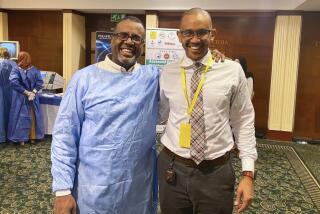Iraq is paging its expatriate doctors
- Share via
BAGHDAD — Ali Bassem plans to start saving for a new car now that the extra money is rolling in.
The Baghdad University architecture professor regards his 75% salary increase as a fitting reward for having stayed in Iraq while so many other people of means fled. The extra dinars in his paycheck, Bassem said, are proof of a tentative step forward from the darkness and violence.
They mean that years after the 2003 U.S.-led invasion, “the government is beginning to take root and establish itself,” he said. A nationwide increase in public-sector salaries took effect at the end of June for civil servants, from rookies to department heads at public hospitals. The lowest-paid civil servants, who earned $100 a month, now receive at least an extra $16 or so.
The new scale includes extra pay for seniority and dependents, and especially for education level. Those who hold a bachelor’s degree get a 50% increase in salary, those with master’s get 75% more, and the salaries of those with doctorates have doubled.
All told, the government will spend an additional $1.8 billion annually on salaries for its employees, all of it from oil revenues, said Ala Abdullah, a member of the parliament’s finance committee. The pay increases are among the first major benefits from post-invasion oil profits, though it comes years later than the Bush administration expected.
Months of diminished violence have allowed Iraq’s battered oil industry to return to its prewar production level of 2.5 million barrels a day. (Before Iraq’s 1990 invasion of Kuwait and the international sanctions that followed, the country was producing almost 4.5 million barrels a day.)
The resurgent production combined with record oil prices adds up to a massive windfall, part of which is being passed on to civil servants.
“This will create more confidence in the government,” Abdullah said. “It’s an indication of stability.”
It’s also a plea aimed at the thousands of Iraqi professionals who fled the country. The message: Things are getting better. Come home.
“This is one of the reasons [for the salary increase] -- to lure some of them back,” Abdullah said.
Five years of insurgency and lawlessness after the ouster of Saddam Hussein took a heavy toll on Iraq’s most educated. University professors and doctors were targeted for assassination by insurgents and for kidnapping by ransom-seeking gangs.
The result was a brain drain among those whose skills would be most needed to help rebuild the country.
Bassem, the architecture professor, said his father-in-law, a well-known orthopedic surgeon, was kidnapped and freed for ransom in 2004. Bassem estimated that Iraq has lost as many as 40% of its physicians, university professors and PhDs since 2003.
Those who stayed found themselves leading double lives. Their education and employment, once a source of respect and social status, had become a bull’s-eye.
For years, Bassem told any stranger who asked that he was a merchant. A colleague, Haidar Assad, a professor of interior design, still keeps his Baghdad University parking sticker in his pocket rather than on his windshield.
Assad says it will take more than higher salaries to lure back the professionals who fled Iraq.
“It’s not just money. It’s money and safety and services and other things.”
Even though the money may be coming and security has slowly been improving, Assad said services and infrastructure are still in tatters.
Electricity, when it’s present in his home for a few hours a day, is “treated like an honored guest,” Assad said.
The salary boost, and the increased stability it implies, might be enough to coax back maybe half the professionals who left, Bassem said. But it won’t be easy.
“There’s no button you can simply push to bring them back,” he said.
Others are even more skeptical.
Neurologist Bashar Saour says it’s too late to bring back most of his departed colleagues, or to prevent further loss. Most of the doctors in Iraq, he said, “still aren’t convinced by these measures and still want to leave the country.”
Saour recalls watching the entire neurology department at Baghdad’s Medical City complex melt away. A senior doctor, Saour’s mentor, was assassinated in 2006. Within months, most of his colleagues had fled. Saour stayed, and he’s still not sure why.
“I can’t even call it patriotism,” he said, laughing, at his central Baghdad clinic. “Something’s just pulling me here.”
He wants to see greater transparency, less corruption and other, more subtle signs of a real, functioning country. He’s still bitter that the Health Ministry “practically collapsed” when placed under the control of the Shiite Muslim faction headed by cleric Muqtada Sadr, who runs the Mahdi Army militia.
“The whole ministry became a personal protectorate for a militia,” Saour said.
“If I take a salary 10 times the ordinary salary, it means nothing if there’s no law,” he said.
Ultimately, the chances of persuading the doctors and professors to come back largely depend on their new lives.
Thousands of highly educated Iraqis are languishing in countries such as Jordan, Syria and Egypt -- unemployed and burning through their savings. For them, the prospect of marginal improvement in Iraq might be enough.
But hundreds of others have found high-paying employment in wealthy Persian Gulf states, where the benefits of oil money come without the downside of an insurgency and a shredded infrastructure.
“The ones who found work in the gulf, they’re not coming back no matter how much you offer them,” Assad said.
--
More to Read
Sign up for Essential California
The most important California stories and recommendations in your inbox every morning.
You may occasionally receive promotional content from the Los Angeles Times.













